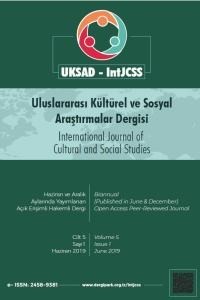The Relationship between R-D Expenditures and Economic Growth: A Case of the Central Asian Republics and Turkey
The Relationship between R-D Expenditures and Economic Growth: A Case of the Central Asian Republics and Turkey
R-D Expenditures economic growth, panel data,
___
- Aghion, P., Howitt, P. (1992), “A Model of Growth Through Creative Destruction”
- Econometrica, Vol:60, No:2, March 1992, s.323-351, JSTOR.
- Altıntaş, H., Mercan, M. (2015), “Ar-Ge Harcamaları ve Ekonomik Büyüme İlişkisi: OECD
- Ülkeleri Üzerine Yatay Kesit Bağımlılığı Altında Panel Eşbütünleşme Analizi” Ankara Üniversitesi, SBF Dergisi, Vol.70/2, pp. 345-376. Ateş, S. (1998), “İçsel Büyüme Modellerinde Fiziksel Sermaye Yatırımlarının Önemi:
- Uluslararası Verilerle Bir Bakış” Çukurova Üniversitesi, İ.İ.B.F. Dergisi, Vol.8/1, Adana. Coe, DT., Helpman, E.(1995), “International R&D Spillovers” European Economic Review (1995) 859-887.
- Deliktaş, E. (2001), “Malthusgil Yaklaşımdan Modern Ekonomik Büyümeye” Ege Akademik Bakış, Vol.1/1, pp.92-114, İzmir.
- Falk, M. (2007), “R&D Spending in The High-Tech Sector and Economic Growth” Research in Economics, 61 (3):140-147.
- Freire-Serén, M. (2001), “R&D-Expenditure in an Endogenous Growth Model” Journal of
- Economics, Vol.74 (2001) No.1, pp.39-62.
- Goel, RK., Ram, R. (1994), “Research and Development Expenditures and Economic
- Growth: A Cross-Country Study” Economic Development and Cultural Change, Vol:42, No:2, January 1994, pp.403-411.
- Granger, C.W.J. (1969). “Investigating Causal Relations By Econometric Models And Cross
- Spectral Methods” Econometrica, Vol.37, No:3, July 1969.
- Grossman, GM., Helpman, E. (1988), “Product Development and International Trade” NBER
- Working Paper Series, Working Paper, No:2540, May 1988, Camridge.
- Grossman, GM., Helpman, E. (2003), “Dış Ticaret, Bilgi Taşmaları ve Büyüme” Çev., Adem
- Üzümcü, C.Ü. İktisadi ve İdari Bilimler Dergisi, Vol.4/2, Sivas. Gülmez, A., Yardımcıoğlu, F. (2012), “OECD Ülkelerinde Ar-Ge Harcaması ve Ekonomik
- Büyüme İlişkisi: Panel Eşbütünleşme ve Panel Nedensellik Analizi (1990-2010)” Maliye
- Dergisi, No:163, July-December 2012, pp.335-353.
- Holtz-Eakin, D, W. Newey, H. Rosen (1988). “Estimating Vector Autoregressions With Panel
- Data” Econometrica, 56(6), s.1371-1395.
- Öztürk, N., Darıcı, H.K., Kesikoğlu F., (2011). “Ekonomik Büyüme ve Finansal Gelişme
- İlişkisi: Gelişmekte Olan Piyasalar İçin Bir Panel Nedensellik Analizi” Marmara Üniversitesi, İİBF Dergisi, Vol.30/1, pp.53-69, İstanbul. Rivera-Batiz, Luis A., Romer, P.M. (1990), “International Trade With Endogenous
- Technological Change” NBER Working Papers Series, Working Paper No:3594, Cambridge.
- Romer, P.M. (1994), “The Origins of Endogenous Growth” The Journal of Economic
- Perspectives, Volume:8, No:1, s.3-22, JSTOR. Samimi, A. J., Alerasoul, S. M. (2009), “R&D and Economic Growth: New Evidence From
- Some Developing Countries” Australian Journal of Basic and Applied Sciences, 3(4): 3464
- Sylwester, K. (2001), “R&D and Economic Growth” Knowledge, Technology & Policy, Vol.13, No.4, pp.71-84.
- Tuncel, CO. (2009), “Ar&Ge Tabanlı Büyüme Modelleri ve Geç Sanayileşen Ülkeler İçin
- Politika Önerileri: Neoklasik ve Evrimci Büyüme Teorilerinin Karşılaştırmalı Analizi” Anadolu International Conference in Economics, June 17-19, 2009, Eskişehir.
- Wang, David Han-Min, Tiffany Hui-Kuang Yu, Hong-Quan Liu (2013), “Heterogeneous
- Effect of High-Tech Industrial R&D Spending on Economic Growth” Journal of Business Research, 66(10):1990-1993.
- Wu, Y., Zhou, L. (2007), “Cointegration and Causality Between R&D Expenditure and Economic Growth in China: 1953-2004” International Conference on Public Administration, 76.
- Yaylalı, M., Akan, Y., Işık, C. (2010) “Türkiye’de Ar-Ge Yatırım Harcamaları ve Ekonomik
- Büyüme Arasındaki Eşbütünleşme ve Nedensellik İlişkisi: 1990-2009” Bilgi Ekonomisi ve Yönetim Dergisi, Vol.5/2, pp.13-26.
- Başlangıç: 2015
- Yayıncı: Mutlu TÜRKMEN
Urban Landcape Design Principles in Historical Environments, a Case Study on Zeyrek, İstanbul
İş Başvurusunda Bireyin Algılanmasında Giysi Türleri ve Modellerinin Etkisi Var mıdır?
Kazakistan-Türkiye Halk Müziği Etkileşiminde Ahmet Hulusi Seven
Economical Indicators Contribution of Tourism Industry to the Economy of the South Kazakhstan Region
Almas KURALBAYEV, Burhan SEVİM, Aktolkin ABUBAKIROVA
Osmanlı Devleti’nde Engellilerin İstihdamı ve Saray Teşkilatında Dilsizler
Kadın Olgusunun Kültürel Gelişimi ve İslam’da Kadının Yeri Üzerine Tartışmalar
